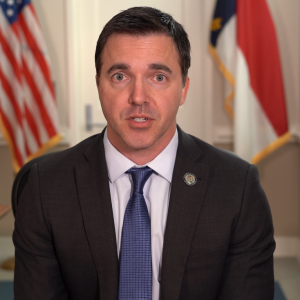
View and download a video from Attorney General Jeff Jackson here.
RALEIGH – Today, Attorney General Jeff Jackson issued a formal warning to the U.S. Department of Agriculture (USDA) after the agency informed states that it may refuse to fund the Supplemental Nutrition Assistance Program (SNAP) during the ongoing federal government shutdown. SNAP provides food assistance to low-income families, and any interruption would be devastating for North Carolina – 1.5 million people, including roughly 600,000 children, rely on it to eat.
“The USDA has the money to keep SNAP running – including $6 billion in reserve funds set aside for exactly this situation. Refusing to use those funds would be unlawful and a stunning disregard for the wellbeing of roughly 600,000 children in our state,” said Attorney General Jeff Jackson. “The USDA cannot withhold food from children just to play shutdown politics – and we will take them to court if they try.”
On October 10, USDA notified all state agencies that administer SNAP that, due to the shutdown, it may not provide full benefits in November – and told states to withhold all payments for now. Nearly 600,000 children depend on SNAP benefits so they don’t go hungry, including more than 40,000 infants under 18 months.
While USDA does have limited authority to adjust SNAP benefits under federal law, it has not demonstrated that any of the legal prerequisites for doing so have been met.
USDA currently holds at least $6 billion in congressionally appropriated reserve funds specifically set aside for emergencies such as this shutdown. The agency also has access to Section 32 funds that could lawfully be used to continue SNAP payments without interruption.
Attorney General Jackson is urging USDA to immediately deploy those resources rather than direct states to freeze already-calculated benefits.
Attorney General Jackson is asking USDA to answer the following critical questions by October 27 or risk further legal action:
- Does USDA/ Food and Nutrition Service (FNS) have contingency funds left over from prior congressional appropriations? If so, how much?
- Does USDA/FNS have access to any other sources of available funds to pay benefits and administrative costs?
- Does USDA/FNS intend to use such funds to furnish SNAP benefits, even at a reduced level? If not, why not? And if so, how does the agency intend to execute that plan, and when would states be expected to send their benefit issuance files?
- Assuming USDA/FNS has contingency funds, on what grounds did the agency direct states to hold November payments, rather than reducing then?
- Should states treat the October 10 letter as a “suspension” of benefits or a “cancellation” of benefits under federal law, or neither?
Attorney General Jackson was joined in sending this letter by the attorneys general of Arizona, California, Colorado, Hawai’i, Connecticut, Illinois, Delaware, Maine, the District of Columbia, Maryland, Massachusetts, New Mexico, Michigan, New York, Minnesota, Nevada, Oregon, New Jersey, Rhode Island, Vermont, Wisconsin, and Washington.
A copy of the letter is available here.
###
